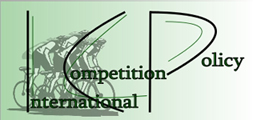Advanced Industrial Organization
Advanced Industrial Organization
(Mikroökonomik für Fortgeschrittene II/Probleme der Wettbewerbs- und Wirtschaftspolitik)
Lecturer:
Prof. Dr. Fabian Herweg
eLearning:
https://elearning.uni-bayreuth.de/
Target audience:
This course is addressed to students who aim to obtain a Master (or PhD) degree in
Economics, Internationale Wirtschaft & Governance, or Philosophy & Economics. Students
who are currently completing a Bachelor program are welcome; they may take this course as
preparation for international PhD programs, or in order to start earning credits for the M.Sc. in
Economics at the University of Bayreuth right now.
The analysis of strategic interactions of firms in markets and the implications for competition
policy will be discussed on a highly abstract theoretical level. Therefore, students who take
part in this course should have a profound knowledge of Microeconomic Theory (Game
Theory) and good mathematical skills.
The course is taught entirely in English and will require continuous self-study throughout the
semester.
Grading of the course will be based on a 60-minute written exam at the end of the term.
Course Description: (Lecture 2SWS + Tutorial 1SWS)
The first part of the course presents models in industrial organization (IO) that are aimed at
explaining firm behavior in different strategic environments: When do firms have an incentive
to price discriminate? Can prices be used as a signal for high quality? What are the incentives
of firms to produce differentiated products? In order to answer these questions, standard tools
of theoretical IO are taught. Models of static as well as dynamic oligopolistic and
monopolistic competition are discussed.
In the second part of the course, the previously gained theoretical insights are used to discuss
various antitrust issues. Should we forbid price discrimination by big manufacturers? How
can we deter cartel formation as an antitrust authority?
Course Outline (scheduled):
1. Partial Equilibrium Analysis and Welfare
2. Monopoly
2.1 One good and a single price
2.2 Multi-product monopolist (Ramsey Pricing, Learning by Doing)
2.3 Durable goods
2.4 Quality and asymmetric information (price as signal of quality)
2.5 Discriminatory pricing (group pricing)
3. Oligopoly Competition
3.1 Price competition (Bertrand)
3.2 Quantity competition (Cournot)
3.3 Price competition with capacity constraints
3.4 Product differentiation (Hotelling)
4. Cartels and Tacit Collusion
4.1 Sustainability of tacit collusion
5. Vertical Relations
5.1 Double marginalization
Main Textbooks that are used:
• Belleflamme, P. und M. Peitz (2010): “Industrial Organization---Markets and
Strategies,“ Cambridge University Press.
• Motta, M. (2004): “Competition Policy---Theory and Practice,” Cambridge University
Press.
• Tirole, J. (1988): “The Theory of Industrial Organization,” MIT Press.
Further Textbooks:
• L. Cabral (2000), Introduction to Industrial Organization, MIT Press.
• O. Shy (1996), Industrial Organization: Theory and Applications, MIT Press.
Books on Cases in Antitrust/ Competition Policy:
• Russo, Schinkel, G¨unster & Carreee (2010), European Commission Decisions on
Competition: Economic Perspectives on Landmark Antitrust and Merger Cases,
Cambridge University Press.
• Lyons (2009), Cases in European Competition Policy: The Economic Analysis,
Cambridge University Press.
• Kwoka & White (2008), The Antitrust Revolution: Economics, Competition, and
Policy, Oxford University Press.

